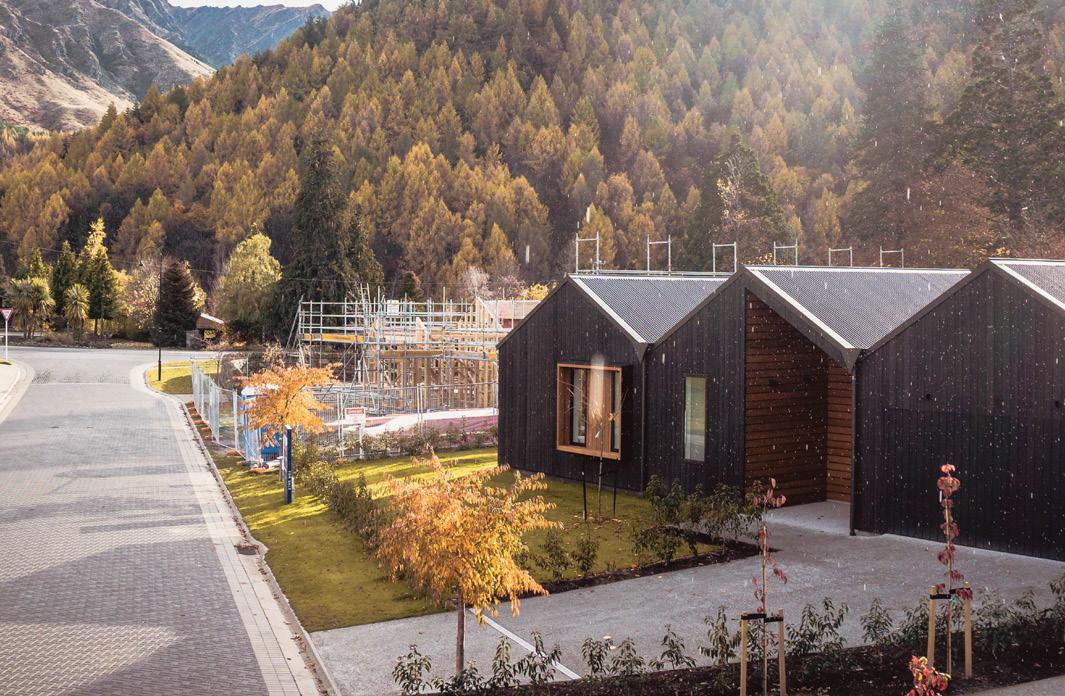
13 minute read
Is It Land of Plenty or a Money Trap?
You won’t get rent from it, but can you get rich anyway? Amy Hamilton Chadwick finds out if it’s worth investing in undeveloped land.
Can you get rich from investing in land? Maybe – but it’s really what you can do with that land that counts.
Advertisement
While the cashed-up super-wealthy can potentially spend tens of millions on land that generates no income, that’s just not realistic for the ordinary Kiwi investor. So, how can you make money from land, and is it worthwhile?
Layer up your profits
You can make money from land at any stage (remember these profits may be taxable). • Speculation: You can make money by buying now and selling it later. For example, you might have bought a $500,000 section and then sell it two years later for $600,000. You’ve made $100,000 and your costs have been negligible – probably just transaction fees and the cost of the mortgage. • Develop the land and sell it: By developing the land to be more usable, you can add value and make a better return. Consider that $500,000 section. If you drew up plans for three townhouses and spent $70,000 on infrastructure consents, now it’s ready for anyone to develop it. You might sell it for $750,000, a $180,000 gain. • Become a developer: By developing houses on the land and selling or holding them, you can maximise your revenue. Let’s say you built three townhouses on your
empty section, at a total cost of $1.2 million. You sell each townhouse for $750,000, so you’ve made a total gain of $550,000 after subtracting your $1.7m land development and construction costs. Each stage makes money, and the more stages you layer up, the more money you’ll make from the land. That’s your reward for taking on a risky, capital-hungry enterprise that doesn’t produce an income for many years.
Extra land doesn’t mean extra growth
It’s not easy to make money from bare land – ask any farmer. As a result, buying land is expensive, but it doesn’t go up in value at a faster rate than homes do.
Townhouses, which generally have smaller sections, for instance, generally gain value at the same rate as standalone homes, according to research by Opes Partners. That data showed any property with more than 100 square metres of land gained value at the same rate – extra land didn’t mean greater growth. So, should you buy a townhouse or a standalone home on a section? It all depends, says Steve McMenemy, Director at Loan Market Development Finance, a highly experienced developer. “If you want a lock-up-and-leave, go for the townhouse. If you’re an investor looking for future upside, you might buy the standalone home on a full site with some upside.

“It will all be budget dependent, but for most sites that are zoned residential and have a storm water solution, you can probably do something with it.”
Buying to subdivide or develop
Buying a site large enough to develop into several townhouses can be a great investment in the right area. McMenemy recently sold an Auckland site that he’d bought with the intention of developing. He and the next-door neighbour were able to sell both their sites to a developer who was looking for exactly that sort of that project. It was a quick win for McMenemy because the market has risen so much, although he points out that developing it himself would have been more profitable. The best land profits come from building several dwellings at once, but it’s a serious undertaking and it’s risky. You’ll need to deal with specialist non-bank lenders, who charge higher interest rates but can be very flexible – and it can be highly stressful. One option is to partner with a builder like Sentinel Homes or Ashcroft Homes that uses well-oiled processes to make it all run smoothly. The quality and experience of the builder are a consideration for the lender. It’s also a good idea to engage a specialist broker because development and construction lending is very different to residential lending. Owning a house on a large section and subdividing it to build a second house or minor dwelling can also be profitable. Because it’s a small project, your bank will probably lend you money to do it. But do your sums before you buy: will the extra cost of the additional land really pay off?
A dream for the future
Do you have your eye on a dream spot for your grand design, retirement, or a future holiday home? You might be thinking about buying a section in the right spot now, before prices keep rising, and then building on it later. The upside is that you have perfect position for the future, but the downside is that you’ll pay holding costs for years without generating any income. And building a single house isn’t likely to be a profitable investment strategy, considering the cost of building. It’s more of a lifestyle choice. McMenemy says: “For me, it would have to be the dream section, otherwise you’ll probably be better off buying something that makes an income, like a rental property. “The first thing you should do is talk to your mortgage broker and find out if you’re in a position to buy, or whether you’re in a sweet position and you can easily buy a section without any income. “Then you can do some scenario planning on the numbers – plus there will probably be a lot of emotion driving it. “If I fell in love with a site, and I knew I wanted to build in 10 years, I would just try to buy it.”
Inflation and You
As inflation chips away at the purchasing power of our money, commercial property is an attractive option, says PMG Investor Relationships Managers Ben Cant and Rory Diver.

Central banks around the world have been pulling levers to combat the economic impacts of Covid-19. The Reserve Bank of New Zealand did this, too, utilising quantative easing and reducing the Official Cash Rate (OCR) to a record low. This led to lower interest rates, which encouraged people to spend. While consumer spending is important, when the supply of money entering the economy begins to outpace economic growth, we experience increasing inflation.
Some inflation is good
Moderate inflation is generally viewed as a positive for our economy. As prices rise, we’ll spend now, to avoid paying more later. As demand for goods and services goes up, we need more supply to meet demand and firms hire workers to boost production. Everyone benefits, the economy grows, demand increases, wages improve and the cycle goes on. The Reserve Bank is tasked with keeping inflation between 1 and 3 per cent. Each quarter, Statistics New Zealand tracks the prices of thousands of items we buy, in the Consumer Price Index (CPI). Since 2000, the index has tracked inflation at an average of around 2.15 per cent a year. But on 18 October, the Reserve Bank said inflation was at 4.9 per cent. This has many investors questioning the structure of their investment portfolios. High inflation can be damaging: • It erodes your purchasing power. You may be left worse off if prices rise faster than your income. • Inflation can undermine the ‘real value’ of an investment if the returns aren’t enough to cover the level of inflation. • Boom and bust cycles. Inflationary periods can be a sign of an overheated economy, leading to it expanding, then
contracting, over and over again1 . With inflation at 4.9 per cent, investors are losing $49 of purchasing power for every $1000 in the bank. Many term deposit rates sit around 1 to 2 per cent2, which won’t offset inflation, especially once tax from returns are deducted. Since we first saw Covid-19 in 2020, the OCR has been cut numerous times, dropping to a record low 0.25 per cent before most recently pushing up to 0.5 per cent. This has kept interest rates across conservative asset classes like cash and bonds very low. Investors in these conservative asset classes have only been treading water since 12-month term deposit rates dipped below 3 per cent in August 2019. Now that inflationary pressures are growing, investors are right to be worried about what their money will soon be worth; and they are asking what asset classes typically perform well through inflationary periods.
Look to physical assets
Investing in physical assets such as directly owned property, precious metals like gold, and real asset shares have historically been reliable options to protect against inflation. These asset classes move in lockstep with inflation and in the past have benefited because capital values are going up at a rate at least equal to, or better than inflation. Directly held real estate generally delivers capital growth over time, while generating reliable cash returns from tenants. However, commercial real estate typically offers longer lease terms and better tenant stability, compared with residential property. With construction costs continuing to increase on the back of supply constraints and increasing inflation, valuations of existing buildings increase too. Commercial leases often include clauses that tie rent reviews to inflation. This helps offset the affects of inflation on rental income and can help preserve yields. This is evident when the average residential property yield in Auckland is 2.8%3 compared to returns of 5.5-6% from PMG’s funds4 .
Delivering returns above inflation
With inflationary pressures rising, the New Zealand commercial property sector is well positioned to continue delivering returns that can offset inflation. Equity markets continue to experience greater volatility, and we are noticing that experienced investors and fund managers continue to gravitate towards investments in real assets such as commercial real estate. Traditional portfolio allocations to conservative assets in bonds and fixed interest are not currently delivering returns that can overcome inflation. If you’re concerned about that, consider directly held New Zealand commercial property as part of a diversified investment portfolio.
Information is correct as of 1/11/2021 and contains the opinions of Ben Cant and Rory Diver, and general commentary and views from PMG. Any information provided in this article is for information purposes only, is not intended to be relied upon, and should not be construed as financial advice. Prospective investors are recommended to seek professional advice from a Financial Advice Provider who takes into account their personal circumstances.
Sources: 1https://www.rbnz.govt.nz/-/media/reservebank/ files/publications/factsheets%20and%20guides/factsheetwhat-is-inflation.pdf 2https://www.interest.co.nz/saving/term-deposits-1-to-5-years 3https://www.blog.reinz.co.nz/reports-1/capital-gainsreport-q1-2021 4Returns are based on historical perfromance of the funds managed by PMG, as at 31 August 2021. Past performance is not a guarantee of future performance. Please refer to pmgfunds.co.nz for current metriocs and more information.
Does Buying a Business Beat Property?
Kiwis are wedded to investment property, but they’re missing out on the superior returns they could get by owning a business, says ABC Business Sales’ Chris Small.

Kiwis love property investing, but are they missing out on better returns and wealth creation opportunities in the business sector?
I’d say they are. Perhaps the most straightforward way to understand the differences and why business investment or ownership has a massive advantage over property is to look at this simple table (below). The numbers make it obvious.
The average house price in New Zealand is currently NZ$826,000, according to the latest statistics from REINZ as at July 2021. Based on a 5 per cent yield rate for an investment residential property, that equates to a gross return before tax of NZ$41,300. The average business price is currently NZ$733,460, and based on a market average multiplier of 3.5x (29 per cent yield) equates to a pre-tax cash return of NZ$212,703. Clearly, there’s a big difference in the annual yields, with business ownership returns six times higher than residential property’s. This analysis excludes capital gains for either asset class. The pre-tax profit for business ownership is based on the company being fully managed, with limited input from the investor. Yes, maybe business ownership does have a higher risk profile than residential property, but at ABC Business Sales, we believe the
Segment Jul-21 Avge Return % Return
General Business Avge Price $733,460 $212,703 29%
Residential Avge Price $826,000 $41,300 5% risk premium for investing in a business is nowhere near six times higher than investing in residential property. Based on this data, we expect business values to continue growing and for more investors to realise this asset class can be lucrative – and rewarding.
We need education
I think there’s a big need to educate the new generation of New Zealanders. The old adage that buying your first property should be your first goal in life is outdated. We should be encouraging young people into businesses as their first investment.
Business ownership offers an income for life and gives you more career choices. Too many Kiwis get caught in the trap of saving for their first home, using all their savings on the deposit and then spend the next 20 years of their life trying to repay the mortgage. They often sacrifice travel, starting a family, career opportunities, and many other life experiences. The current government and many economic

commentators accept that having most Kiwis’ net worth tied to property is not good for our economy, nor is it good for the country’s growth prospects. Property as an asset class doesn’t provide jobs, doesn’t improve our nation’s productivity, and it doesn’t help with our export dollars.
Property’s up against it
We’ve recently seen new tax rules put in place to slash the benefits of property investment.
With interest costs no longer tax deductible on investment properties, but business lending allowed as a tax-deductible expense, it gives you an inkling of where the government’s thinking is right now. Currently around 72,000 residential houses are sold a year, versus business sales of between 1,000 and 1,500. Clearly, there’s a big mismatch when we think of the contribution each asset class makes to our economy. Recent surveys are starting to show a tide turning away from investment property. Tony Alexander’s most recent survey of property investors said only a net 15 per cent are likely to invest in property going forward, versus a net 58 per cent who would look at investing in business assets in the future.
The price-to-income gap
For New Zealand to see a major move in investment patterns away from property and into business segments, we’ll need the support of the education sector. It could well take a generation before we see significant changes. I really believe, in 20 years, if everyone under the age of 30 has a goal to own a business rather than a house as their first asset, it would hugely benefit New Zealand’s culture, community and economy. The new generation really needs to start thinking about the price-to-income gap created as the housing market gets harder to enter. They need start looking for alternative ways to bridge this gap. If housing prices aren’t going down, buyers will need to lift their income. The best way to do this is to buy a business. It’ll give them a big lift in income, something that can be used later to help fund a home loan or a property investment. Relying on your salary, hoping you’ll get a pay rise each year, and then waiting to save a deposit isn’t the fastest way to bridge the income gap. New Zealand’s obsession with property investing stems from our culture and what our parents and family tell us. I believe, for us to make a move away from this obsession, one of two things needs to happen: 1. A property crash scares a whole generation away from the property investment class, in the same way as the 1987 share market crash made a generation scared and sceptical of investing in the share market. 2. The government provides fiscal stimulus and subsidies to encourage investment dollars away from property and into the business sector. We’ll need this to be supported by our educational sector, creating a new generation of young entrepreneurs.










